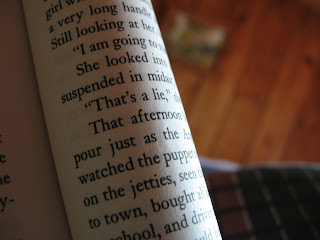Wow. Is it hot in here or is it just me?
Ahem.
Don’t look now but I’m probably blushing bright red and feeling somewhat uncomfortable to be seen in public having just finished Michel Houellebecq’s Platform. It’s the French entry in my Around the World in 52 Books challenge (changed from Nemirovsky) and it’s also on the 1001 Books list, which is also why I made the swap, I don’t mind killing two lists with one title.
Platform is a spicy, sensual, almost-porn-like novel about, well, a man named Michel who finds himself completely cut off from life after his father’s death (he was murdered). Despite the fact that he has very little in the way of human contact, no friends, etc., he has a lot of very graphic sex between these covers. Just after his father’s murderer is caught, Michel leaves Paris and takes a trip to Thailand, where he sleeps with many nubile prostitutes and also meets Valerie, who will later become his lover, then the love of his life, and then a catalyst for the rest of the story.
It is through this relationship with Valerie, who works for the travel company arranging the tours, that Michel redeems himself. They are well suited: he loves getting pleasure; she loves giving it. Aw, a match made in heaven. Oh, and she’s into women, so my goodness, it’s one steam room fantasy away from Pay-Per-View. Yawn.
I know I’m being flippant, and even though Michel doesn’t necessarily use the word love, his feelings for Valerie result in his happiness and in his feeling a connection for a member of the opposite sex that he has never before felt in his life. As their relationship progresses, Valerie’s career takes off as she and her boss, Jean-Yves, move companies and launch a series of high profile resort holidays. While checking out one of the hotels in their roster, Michel has a brainwave to capitalize on the sex trade aspect of vacationing in places like Thailand, among other countries, including Cuba, and a new type of resort is born.
What keeps the novel from trailing off into Harlequin romance for men territory is Houellebecq’s razor sharp prose. One part life story, and two parts love story, Platform also deals with a number of political, racial and societal issues. And while the main character seems motivated by his sexual relationships, it seems he’s also wildly aware of the problems that this brings to the human psyche. It’s a strangely prophetic novel, especially as its central tragedy comes about as a result of religious terrorism.
Houellebecq’s not afraid of saying things that may not be politically correct; it seems, he just wants to point out the odd ironies that life seems to keep throwing in his direction. And yes, there’s the sex: it’s rampant, violent, open, honest, often and sometimes even strangely compelling. It becomes a crucial way for Michel to tell his story. But in a way it’s also kind of gratuitous, often over-exposed and a little over the top. Maybe that’s just my own Western prudishness coming out, but there’s a fine line between porn and art, and maybe I’m just not one to tell the difference?
One review I read over at the Guardian (which gives away the ending, shockingly, so don’t read if you don’t want it spoiled), insists that Houellebecq is writing back to L’Etranger, in a way bringing those kind of existential concerns into the modern century, when it’s not just the human condition, but the human condition in the world that seems to result in a crisis of consciousness.
And I kind of agree, there’s a depth to this novel; it’s bookish at the same time as it’s somewhat bent. I enjoyed Platform, but I most certainly wouldn’t be giving it to my grandmother for Christmas. Or to anyone else who might blush at the mere mention of the word sex in print (fingers pointed right at me).
Not having anything around to read is dangerous: you have to content yourself with life itself, and that can lead you to take risks.
 Right now, I think I might just be in a Hemingway phase. I mean, I’m not daft in thinking that this is an original phase to be in, but I’m still so taken with his gorgeous house in Cuba, that my curiosity is now officially getting the better of me. I’ve seen how the man lived, now I can’t get enough of knowing what the man wrote.
Right now, I think I might just be in a Hemingway phase. I mean, I’m not daft in thinking that this is an original phase to be in, but I’m still so taken with his gorgeous house in Cuba, that my curiosity is now officially getting the better of me. I’ve seen how the man lived, now I can’t get enough of knowing what the man wrote. 

